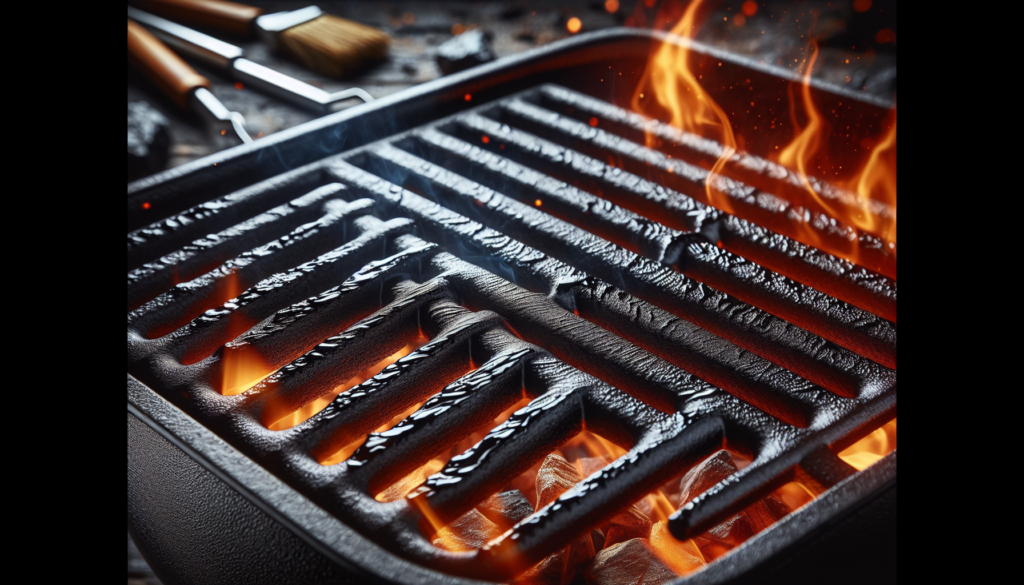In this article, you will learn an essential skill for backyard barbecue enthusiasts – how to season your cast iron grill grates. If you want to achieve that perfect, mouthwatering flavor in your grilled dishes, seasoning your grill grates is a crucial step. By following a few simple steps and using basic household ingredients, you’ll be able to keep your grill grates in optimal condition and enhance the taste of your grilled delicacies. So, grab your apron, fire up the grill, and get ready to elevate your grilling game to a whole new level!
Choosing the Right Oil
When it comes to seasoning your cast iron grill grates, choosing the right oil is crucial. Oils with high smoke points are ideal for this purpose, as they can withstand the high temperatures that grilling requires. Some examples of oils with high smoke points include canola oil, vegetable oil, and peanut oil. These oils won’t break down or produce harmful fumes when exposed to the heat of the grill.
Additionally, it’s important to avoid oils with strong flavors. While olive oil may be delicious for cooking, its strong flavor can overpower the taste of your food when used for seasoning grill grates. Stick to more neutral oils to ensure that the natural flavors of your grilled delights shine through.
Lastly, consider using oils with high saturated fat content for seasoning. Saturated fats can create a protective layer on the grill grates, helping to prevent rust and corrosion. Coconut oil and animal fats, such as lard or bacon grease, are excellent options to consider.
Preparing the Grill Grates
Before you begin the seasoning process, it’s essential to prepare your grill grates properly. Start by cleaning the grates thoroughly to remove any dirt, grease, or leftover food particles. A wire brush or a grill scraper can come in handy for this task. Make sure to scrub both the top and bottom of the grates to ensure a clean surface.
If you notice any rust or debris on the grates, it’s essential to remove them before seasoning. Rust can affect the flavor of your food and cause the seasoning to flake off. You can use a wire brush or steel wool to scrub away the rust and debris. Once again, be thorough and make sure to clean all sides of the grates.
After cleaning, it’s crucial to dry the grates completely. Moisture can lead to rust, so take the time to air dry the grates or use a towel to wipe away any remaining moisture. Ensuring that the grates are completely dry will help the seasoning process be more effective and long-lasting.

Applying the Initial Oil Coating
Now that your grill grates are clean and dry, it’s time to apply the initial oil coating. Before doing so, warm up the grill. This will make the grates expand slightly, allowing the oil to penetrate the porous surface of the cast iron more effectively.
Choose a high-smoke point oil, such as canola oil or vegetable oil, and apply a thin coat onto the grates. It’s important to ensure even coverage of oil, so use a brush or a paper towel to spread it evenly. This will help create a uniform protective layer on the grates.
Once you’ve applied the oil, allow the grates to cool down. This will help the oil to adhere to the cast iron grates, creating a sturdy and long-lasting seasoning layer. It’s essential to be patient during this process, as rushing it may result in uneven seasoning or flaking.
Creating Multiple Layers of Seasoning
To achieve a well-seasoned grill, it’s recommended to apply multiple layers of seasoning. This will enhance the durability and effectiveness of the seasoning, giving you superior grilling results. After the initial oil coating has cooled down, apply another thin layer of oil on the grates.
Repeat this process multiple times, allowing each layer to dry and cool before applying the next one. The more layers of seasoning you create, the stronger and more resilient the protective coating will be. It’s important to give each layer enough time to dry and cool, as this will ensure that the oil properly bonds with the cast iron.

Maintaining Seasoned Grill Grates
Once you have successfully seasoned your grill grates, it’s essential to properly maintain them to prolong their lifespan and retain their non-stick properties. After each use, make sure to clean the grates thoroughly. Use a wire brush or grill scraper to remove any stuck-on food particles, but be gentle to avoid damaging the seasoning.
Avoid using harsh cleaning methods, such as abrasive cleaners or metal brushes, as they can strip away the seasoned layer. Instead, opt for a gentle dish soap and warm water to clean the grates. After cleaning, make sure to rinse thoroughly to remove any soap residue.
After cleaning, it’s crucial to reapply a thin layer of oil to the grates. This will help replenish the seasoning and restore the non-stick properties. Using a brush or a paper towel, apply the oil evenly across the grates. This step is essential to prevent rust and corrosion, as the oil acts as a protective barrier.
Dealing with Rust or Flaking Seasoning
If you notice any rust or flaking seasoning on your grill grates, it’s important to address it promptly. Rust can affect the flavor of your food and compromise the quality of your grilling experience. To remove the rust or flaking seasoning, start by scrubbing the affected area with steel wool. This will help remove the rust and create a clean surface for the new seasoning layers.
Once the rust or flaking seasoning is removed, it’s time to reapply multiple layers of seasoning. Follow the same process of applying a thin layer of oil, allowing it to dry and cool before each new layer. This will help build up a fresh seasoning coating and restore the grates to their optimal state.
Avoiding Pitfalls in Grill Grate Seasoning
When it comes to seasoning grill grates, there are a few common pitfalls to avoid. Firstly, make sure not to use low smoke point oils. Oils like olive oil or butter have low smoke points and can break down quickly when exposed to the high heat of the grill. This can result in a sticky residue on your grates and negatively impact the flavor of your food.
Additionally, avoid using oils with overly strong flavors for seasoning. While they may be delicious in other cooking applications, strong-flavored oils can overpower the taste of your grilled food. Stick to more neutral oils for the best results.
Patience is key when seasoning grill grates. Don’t rush the process by applying too many layers too quickly or using excessive heat. Take your time and allow each layer to dry and cool before proceeding. This will ensure that the seasoning is properly bonded to the grates and will result in a more robust and long-lasting seasoning.
Lastly, avoid excessive heat during the seasoning process. High heat can cause the oil to burn and create a sticky residue on your grates. Stick to moderate heat levels to achieve the best seasoning results.
Benefits of Properly Seasoned Grill Grates
Properly seasoned grill grates offer a multitude of benefits that can significantly enhance your grilling experience. Firstly, a well-seasoned grill grate can provide enhanced flavor and searing for your food. The seasoning helps to develop a beautiful crust on your meats and vegetables, resulting in a delicious, caramelized exterior.
In addition, properly seasoned grates offer improved non-stick properties. This means that your food is less likely to stick to the grates, making it easier to flip and remove without any hassle. This reduces the chances of your food tearing or falling apart during the cooking process.
Seasoned grill grates also have a reduced chance of rust and corrosion. The layers of seasoning act as a protective barrier, preventing moisture from coming into direct contact with the cast iron grates. This helps to extend the lifespan of your grates and keep them in optimal condition for longer.
Lastly, properly seasoned grill grates can contribute to the extended lifespan of your grill. By taking the time to season and maintain your grates, you’re ensuring that they remain in top shape, minimizing the need for replacements or repairs. This can save you money in the long run and allow you to enjoy countless delicious meals on your well-seasoned grill.
Alternative Seasoning Methods
While the traditional method of seasoning grill grates involves using the grill itself, there are alternative methods you can try. If you don’t have access to a grill, or simply prefer a different approach, here are a few alternatives:
-
Using an oven: Preheat your oven to 350°F (175°C). Place the clean and dry grill grates on a baking sheet lined with aluminum foil. Brush a thin layer of oil onto the grates, ensuring even coverage. Bake the grates in the oven for about one hour, then allow them to cool completely. Repeat the process several times to build up the seasoning layers.
-
Using a seasoning spray: Some companies offer seasoning sprays specifically designed for grill grates. These sprays often contain a mixture of oils and other seasonings that can help expedite the seasoning process. Simply spray the product onto the grates, following the manufacturer’s instructions, and allow it to dry.
-
Using a torch: This method is for those who enjoy a bit of adventure in their seasoning process. Using a propane torch, carefully heat the grill grates until they reach the desired temperature. Once heated, apply a thin layer of oil using a brush or a paper towel. The oil should sizzle upon contact with the hot grates. Allow the grates to cool completely, then repeat the process multiple times.
Conclusion
Seasoning your cast iron grill grates is an essential step to ensure optimal performance and longevity. By choosing the right oil, preparing the grates correctly, and applying multiple layers of seasoning, you can enhance the flavor, create a non-stick cooking surface, and protect your grates from rust and corrosion.
Remember to clean the grates after each use, avoiding harsh cleaning methods that can remove the seasoning. Reapplying a thin layer of oil after cleaning will help maintain the seasoning and protect the grates. If you encounter rust or flaking seasoning, promptly address it by scrubbing the affected area and reapplying multiple layers of seasoning.
Avoid common pitfalls such as using low smoke point oils, oils with strong flavors, rushing the seasoning process, and excessive heat. Take your time and be patient to achieve the best results.
Experiment with different oils and alternative seasoning methods, such as using an oven, a seasoning spray, or a torch. Find the approach that works best for you and enjoy the benefits of a well-seasoned grill, including enhanced flavor, improved non-stick properties, reduced rust and corrosion, and an extended lifespan for your grill grates. Happy grilling!
